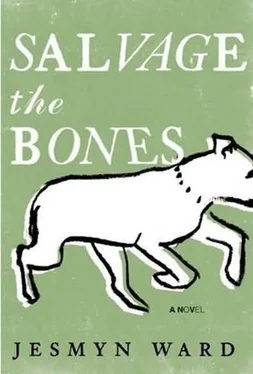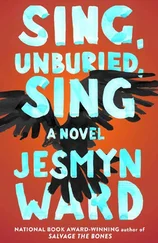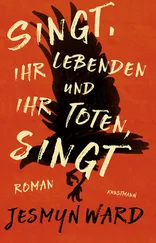On the walk back, it is weird to see Randall walking without swinging his long loose arms. The wood is a sleeping animal: still empty. It is all wrong. I hear the rustling before Randall does, and I have to reach out to stop him, since he has been watching his bad knee.
“Look.”
It is China. She drops something rust-colored and then shoves her nose in it from side to side like a screwdriver. Then she points with her head and dives into what she has dropped, rolling in it; she moves like smoke, the pink pads of her feet waving in the air. Her eyes are squeezed shut and she wears a wide, gum-bearing leer. Her fur is turning red.
“What is that?” Randall asks.
China must hear because she stops her squirming mid-roll and springs up, water frozen to ice, her lips sealed, her tail out. She sees us, looks down at her prize, and then raises her nose to the simmering sky and barks, once. Then she runs away.
It is a dead chicken, opened raw and still warm. I imagine that it looks like the inside of my throat, pink with salt and blood.
“That’s ours,” I say, but Randall is silent as he starts walk-hopping toward the Pit and the house.
“What are you doing?”
Randall says it like he’s been at the park all day, running himself darker and straighter on the court, running himself until all he becomes is muscle and breath. He is tired, and he stands in the doorway of his room, the hall light on overhead, staring. It was a long walk. I shuffle down the hall, alcohol in hand, a wet paper towel for his fist, which he holds close enough to his face to suck. Junior sucked his knuckles until he was two, then he stopped.
Skeet is sitting on his bed, and China has her forelegs on his lap, her nose up; when her neck moves, she is graceful as the spider lilies that grow out on the bayou, bending out over the water. She is licking Skeetah’s chin. There are pink smears from the chicken on her jaw. Skeetah is smiling, the kind of shy smile I haven’t seen on his face since he used to steal packets of Kool-Aid when we were younger and suck the bitter powder, his teeth electric blue or blood red. The puppies sigh and whine in their bucket, which is in the corner of their room along with the fifty-pound bags of dog food, the leashes, the half-shredded tires, China’s blanket.
“I’m bringing her inside for the storm.” Skeetah doesn’t look up.
“Fuck no,” Randall says.
“I ain’t leaving them in the shed.”
“Why not?”
“It ain’t strong enough is why not.”
“Ain’t nothing wrong with it.”
“It’s too flimsy for them.”
“This is a house, Skeetah. For humans. Not for dogs.”
Skeet looks up. The shy smile, gone. He stops China’s licking by muzzling her with both hands, and she is as still as any of the wrecks in the yard. The scabbed-over wounds on her make her look as rusted as they are.
“I’m not leaving them out there.”
Randall’s face shatters then, and all that’s left is an open window.
“I’m telling Daddy.”
“Fucking tell him then.” Skeetah is all teeth. He lets go of China and stands, and she slides off of him, lands squarely, follows Skeet out of the room. All three of them stand in the door of Daddy’s room as Randall yanks it open and goes in.
“Daddy.” No sound. “Daddy!”
Daddy lays on his side with his back to us like he’s just fallen from something tall, a tree or a fence, and has shattered bone. He rolls over to face us, drags himself up on an elbow.
“What?” This sounds ripped from him, as if he is speaking around the pain. “What do you want?”
“Skeet trying to bring the dogs inside for the storm.”
“Inside?” Daddy’s eyes shine in the dark like an armadillo’s. “Inside what?”
“Inside the house.”
“No,” Daddy says. He lays back on his pillows, rolls toward his hand.
“No,” says Skeetah. He elbows past Randall, stands in front of him. China weaves through at his thigh, sits, her tongue out, looking almost like a normal dog. “I’m not leaving them out there.”
“No?” Daddy faces him, lurches up on an elbow. “What you mean, no? I said they couldn’t stay and they can’t!” He would be shouting if he was better, but he stops for breath between every other word, and what comes out is in wheezes.
“If they go, I go,” Skeetah says.
“What?” Daddy breathes.
“If they go out in the shed, I go in the shed.” Skeetah steps farther into Daddy’s black room, and he is a blankness in the dark, his voice coming from no face, no head. China glows like white sand on a moonlit river beach.
“You ain’t going out in no shed”-Daddy coughs, his throat dry-“with no dog.”
“Yes, I am.” The darkness moves. “And if Randall try to stop me, we going to fight. All of us.”
“Don’t make me get up.” Daddy swings his legs over the side of the bed, pushes up with his good hand, but his feet get tangled up in the sheets, and he tries to untangle them with his bad hand, and then yanks it back up and wobbles, high from the pain medicine. He lists like he’s drunk.
Skeetah moves to leave Daddy’s room and comes into the light from the lighbulb in the hallway like a swimmer surfacing from a dark swimming hole: Manny swimming up from the bottom of the black hole, eating light, splashing out, being born.
“Everything deserve to live,” Skeetah says. “And her and the puppies going to live.”
“Skeet,” Randall says, and Skeet and China stop in their walk, all three of them meeting in the doorway, China’s ears flat on her head, tail up, still and tense as Skeetah.
“What?” Skeetah barks. They are on either side of a crooked mirror, one short, the other tall, both muscle and tendon, tension, wounded knuckles, hands curling.
“I ain’t sleeping in the room with her.” Randall reaches. His good hand grabs.
“Stop!” Daddy’s voice is hard, loud. He slumps like it was all he had in him to breathe it out. “No. No fighting.”
I have to lean to hear him. He sways, punches his good arm in the mattress to hold himself up.
“It’s a category five,” Daddy says. “Woman on the news say it’s a category five.”
“Oh,” I say, but it is more a breath than a word. Daddy has faced a category 5, but we’re too young to remember the last category 5 hurricane that hit the coast: Camille, almost forty years ago. But Mama told us stories about that one.
“She stay in the room, Skeet. If I see her once out, I’m kicking her out in the middle of the storm, you hear? Randall, make do.”
Daddy’s arm buckles.
“I need some soup, Esch.”
Skeetah folds his arms, cocks his head at Randall like a dog. Randall shakes his.
“We usually sleep in the living room anyway, Randall,” I say, whispering, remembering how tender he was when he found me in the ditch.
“Esch,” Daddy breathes. He lays back on his side, facing the door.
“Yeah, Daddy,” Randall says. “I’ll get it.” He brushes by, stiff-armed, and leaves me and Skeetah standing in the hallway. The gas hisses on in the kitchen.
“Everything need a chance, Esch,” Skeet says, and he and China turn into his doorway. China sprawls on the floor, ears pointed to the ceiling again. Her tail thumps, and she smiles. The skin on either side of her scabbed breast pulls tight. Skeetah takes the puppies out one by one, cupping their round bellies, and lays them on the floor, where their noses start twitching and they begin jerking toward China. She looks at them like she looked at the chickens earlier. She licks. “Everything,” Skeetah says and looks through me.
THE ELEVENTH DAY: KATRINA
When mama first explained to me what a hurricane was, I thought that all the animals ran away, that they fled the storms before they came, that they put their noses to the wind days before and knew. That maybe they stuck their tongues out, pink and warm, to taste, to make sure. That the deer looked at their companions and leapt. That the foxes chattered to themselves, rolled their shoulders, and started off. And maybe the bigger animals do. But now I think that other animals, like the squirrels and the rabbits, don’t do that at all. Maybe the small don’t run. Maybe the small pause on their branches, the pine-lined earth, nose up, catch that coming storm air that would smell like salt to them, like salt and clean burning fire, and they prepare like us. The squirrels pack feathers, pack pine straw, pack shed fur and acorns from the oaks in the bowels of their trees, line them so that they are buried deep in the trunks, so safe they can hardly hear the storm cracking around them. The rabbits stand in profile, shank to shank, smell that storm smell that hits them all at once like a loud sound, and they tunnel down through the red clay and the sand, down until the earth turns black and cold, down past all the roots, until they have dug great halls so deep that they sit right above the underground reservoirs we tap into with our wells, and during the hurricane, they hear water lapping above and below while they sit safe in the hand of the earth.
Читать дальше












